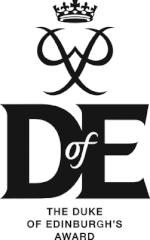Duke of Edinburgh Award
| The Duke of Edinburgh's Award | |
|---|---|
 |
|
| Date | 1956 |
| Country | United Kingdom and others |
| Reward(s) | Gold, Silver or Bronze (UK) |
| Official website | http://www.dofe.org |
The Duke of Edinburgh's Award (commonly abbreviated DofE), is the generic name for a youth awards programme founded in the United Kingdom in 1956 by Prince Philip, Duke of Edinburgh, that has since expanded to 144 nations. The awards recognise adolescents and young adults for completing a series of self-improvement exercises modelled on Kurt Hahn's solution to the "Six Declines of Modern Youth".
In the United Kingdom the programme is run by The Duke of Edinburgh's Award, a royal charter corporation. A separate entity, The Duke of Edinburgh's International Award Foundation, promotes the award abroad and acts as a coordinating body for award sponsors in other nations, which are organised into 62 National Award Authorities and a number of Independent Operators. Award sponsors in countries outside the United Kingdom may title their awards Duke of Edinburgh's Awards, though the recognition also operates under a variety of other names in countries without a historic link to the British monarchy, or that have severed such links.
In February 1956, The Duke of Edinburgh's Award was first announced. It was at first "for boys" aged 15 to 18. It was first administered, and largely designed, by John Hunt, who had led the first successful climb of Everest in 1953, and had retired from the army to run The Duke of Edinburgh's Award. It was designed to attract boys who had not been interested in joining one of the main British youth movements, such as the Scout Association. It was not necessary to 'join' any organisation, or wear a uniform to participate. In the first 12 months, 7,000 boys had enrolled for the scheme. The programme borrowed from the Moray Badge, instituted at Gordonstoun School by its headmaster, Kurt Hahn, in 1936, and the County Badge adopted in Moray in 1941.
In November 1957 it was announced that girls would be invited to participate. On 19 June 1958 the Award was extended to girls, with the first girls allowed to join from 1 September 1958. The programme for girls was not the same as that for boys, and was for ages 14 to 20. The first girls received their Gold Awards on 3 November 1959 at Buckingham Palace. From January 1965, the Gold Award for boys and girls was made more similar.
...
Wikipedia
